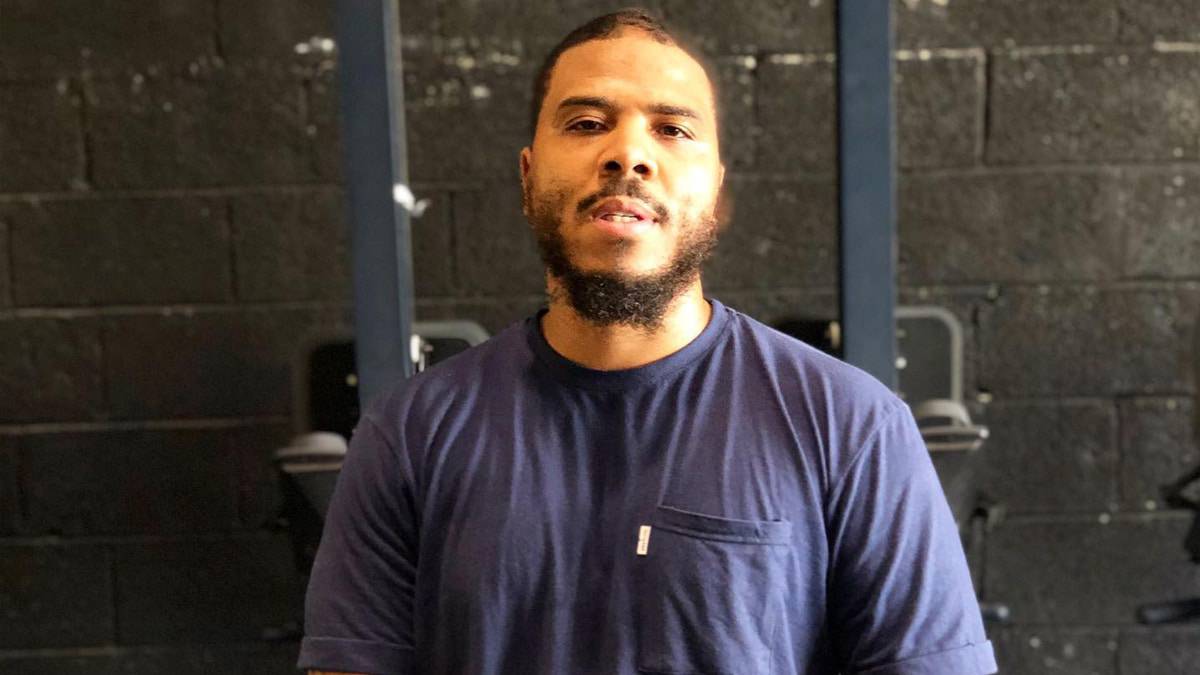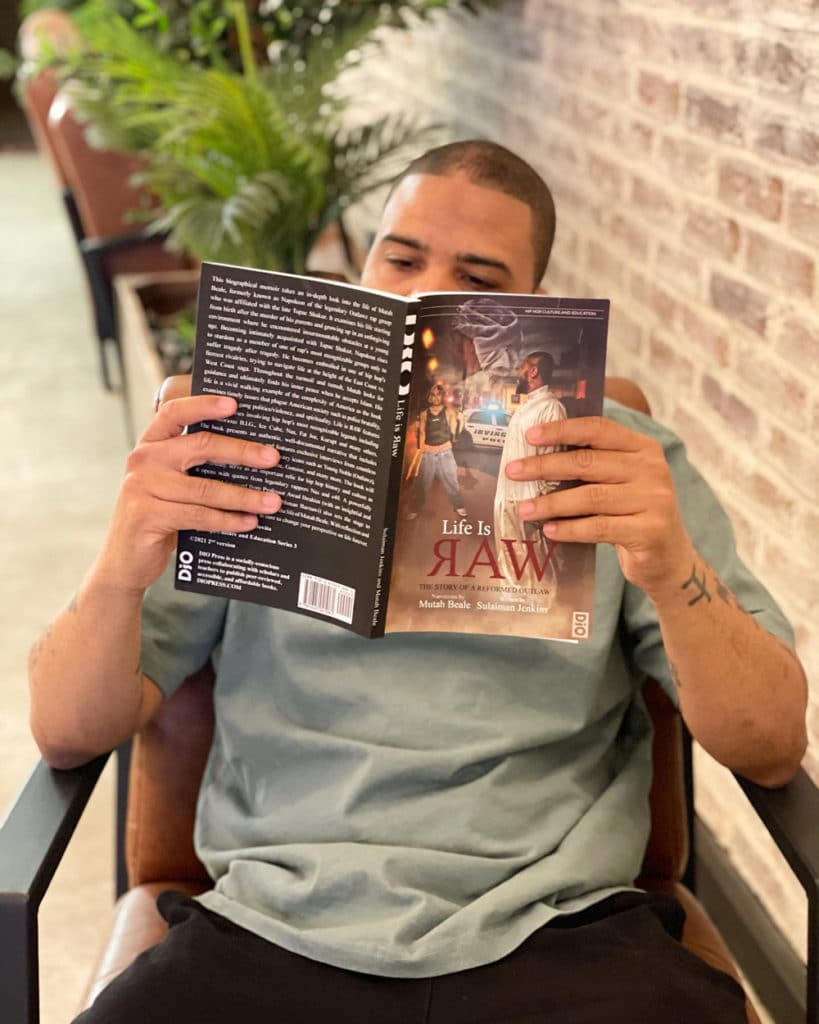Rising From the Concrete: A Book Review of Life is Raw

Mutah “Napoleon” Beale along with author Sulaiman Jenkins is set to release Life is Raw: The Story of a Reformed Outlaw. The auto/biography takes an in-depth look into the life of Mutah Beale. Purchase Here.
It’s said that reality is lived in extremes, for to not know agony and bliss is akin to a psychological and spiritual death, a life wherein one merely exists. And we often find ourselves looking to the sages of lore to ask the burning question of how to live, choosing wisdom over escapism. A philosophy of life, and its practical blueprint, feels out of reach for many as they starve from a lack of meaning in the way a beggar would from a lack of nourishment. This sense of emptiness is epitomized in the life of Mutah “Napoleon” Beale, the rapper turned philosopher, who, due to his lyrical prowess and close associations with Tupac Shakur and Death Row Records, is a staple in hip-hop history.
In Life is Raw: The Story of a Reformed Outlaw, co-authors Sulaiman Jenkins and Mutah Beale take us on a quest into the depths of human agony, asking: Is redemption possible? It begins with unimaginable trauma, recounting the afternoon in which Mutah witnessed the murders of both parents and unravels like a ball of yarn, linking his subsequent decisions, feelings, and beliefs to that formative experience. The psychological cliché, which is now a cultural one, is that character is inextricably linked to childhood, that the person you become is, in large part, dependent on your early environment: the worse the environment, the higher the probability of developing a difficult personality. And we bear witness to this axiom in the initial part of the biography.

The first half of the book has a mostly somber tone, providing us with a glimpse into the mind of an individual who can’t make sense of his extreme suffering, who, like many of us, struggled to find the purpose of his tragic existence. He drank too much, cursed too much, and lacked empathy and compassion. Death haunted him, but he also baited it. It was as though he felt cornered, and figured embrace was superior to fear, control to capitulation. The narrative chronicles the losses of his parents, aunt, grandmother, brother, Tupac, Kadafi, and countless others, begging one to question: Would I have lost the will to live if I were he?
Jenkins wrote: The heart has the remarkable ability to compartmentalize pain and misery, creating a space for moments of happiness when necessary. And the love that encapsulated Mutah (stemming from friends, family, and the ability and desire to create his art) propelled him to stardom. In that tempestuous period, he earned the widespread respect and affection other Black men sought after in vocalizing their trials; like Tupac, he became their voice. And, Jenkins quickly noted the disproportionate rate at which the world heard Black musicians when compared to their white counterparts. Mutah seized the rare opportunity and carved out an indelible path in the music industry, with stories about violence, courage, and loyalty, heroic tales comparable to the ancient Greek epics of war.
I was struck by how much I identified with him. In fact, I was the same out-of-control kid who got thrown out of school for wanting too much attention. Mutah’s journey highlighted the lack of concern from a system that failed to care about its most vulnerable. Why didn’t someone intervene? Why was he expelled instead? Why didn’t someone try to help me when I was clearly crying out for it? Why is punishment always the answer? Are some of us truly beyond hope?
The last question is answered in the biography’s final sections. As Mutah becomes more introspective and accepting of love’s gifts, the reader learns that existence precedes essence, that character, with the right amount of thoughtfulness and warmth, can blossom like a flower, or a rose from a concrete pavement.
“I tried to tell you this before when I was knee deep as an Outlaw, Was known as the first to draw the last to dash, .44 in my hand to blast, But this was all in the past, Yes, that was before. Cuz Life is ЯAW.”
Mutah Beale
A kernel of maturity was implanted in him by his grandmother and later cultivated by mentors and friends along the way. In the darkness of his environment hid the brilliance of his heart. His story offers hope and challenges the belief that one’s environment is his destiny. This book is a testament to trauma and love’s ability to heal it. In it, we locate the emotional, psychological, and even spiritual tools requisite for its remedy.
As with any good book, you get to discover yourself within its pages; although, I think that I found too much of myself in it. It paints images of Napoleon’s resilient spirit and Tupac’s unshakable humanity, providing the reader with peaks into the minds of men whose deeds were often only partially portrayed in the mainstream media.

Sulaiman weaved his narrative with Mutah’s, creating a coherent and captivating account of a man who spent his life staring into the abyss, daring it to reel him in. If there’s one criticism, it’s that I wish I had more insight into Mutah’s psyche; I simply wish I knew more about him. But, no one can ever fully know him. And, I have to accept an existential limitation. In the background of Mutah’s life, Life is Raw details police brutality and violence, culturally significant events spanning several decades, and the atmospheres in several Black communities, utilizing various reliable sources to create a record for academics and laypeople alike.
Throughout his life, Mutah’s environments both stifled and nurtured him and, in the end, Islam tipped the scale. His saga is both tragic and hopeful, an embodiment of life itself. Napoleon, Mutah, did more than simply exist.
Purchase Here. Follow: Mutah Beale (@mutahbeale) and Sulaiman Jenkins (@sulaimanjenkins).

